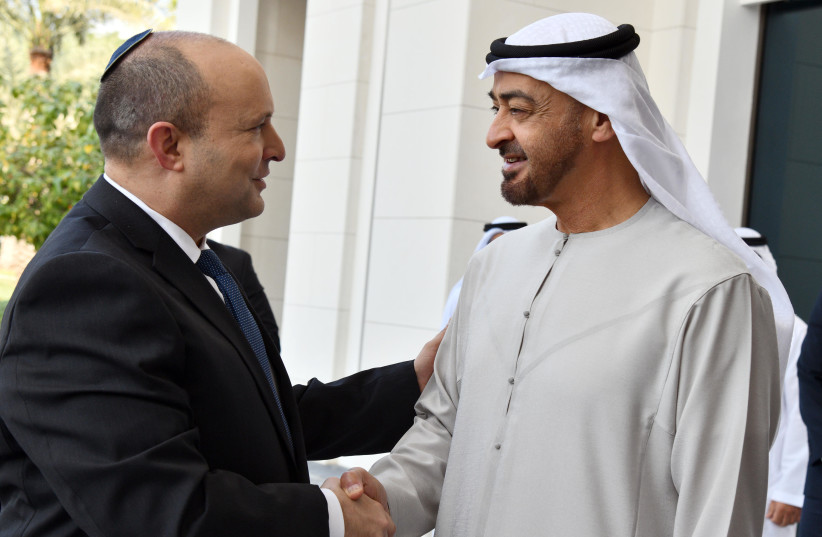When President Isaac Herzog flies to the Unites Arab Emirates on Sunday, marking the first official visit of an Israeli President to the Gulf state, he will be welcomed by the man who is arguably the Middle East’s most effective educational reformer.
According to The New York Times, Crown Prince Mohamed bin Zayed Al Nahyan, also known as MBZ, undertook a bottom-up review of all of his country’s vulnerabilities to terrorist attacks after 9/11.
Among other things, MBZ took a long, hard look at the UAE’s education ministry which Islamists had previously made into a state within a state of sorts, demanding a sweeping rewrite of the country’s textbooks. This reformed curriculum has been reviewed by the Institute for Monitoring Peace and Tolerance in School Education (IMPACT-se) in a report authored by Dr. Eldad Pardo and released this week.
Tens of thousands of Israeli tourists have joyfully, and in the main, respectfully discovered Dubai and Abu Dhabi following the signing of the Abraham Accords on September 15, 2020. We would suggest that the much-discussed Emirati warm welcome of Israelis is deeply rooted in the country’s educational system. Over the 26 years that IMPACT-se has been reviewing curricula in the Arab and Muslim world, this Emirati set of textbooks fits most closely with international standards of peace and tolerance.
The UAE is developing strategically to secure a stake in the emerging world order and understands that education for tolerance and peaceful coexistence is critical for societies to flourish. Emirati students are taught that prosperity and national pride are intrinsically linked to peace and tolerance, a theme that runs throughout the curriculum. Textbooks takes the psychological well-being of its students seriously, educating young generations morally and spiritually for a rapidly changing global society.

Peaceful coexistence and love among people are not just a moral obligation but are also portrayed as sensible and worthwhile. Imagination and curiosity toward other cultures and civilizations are encouraged. Positivity and experiencing happiness are fundamental values for leading a rich, fulfilling and healthy life. It is instructive to compare this approach with the dark, violent, and Manichaean curricula of Iran and the Palestinian Authority.
WE FOUND no instances of antisemitism in the textbooks. In fact, messaging focused on tolerance toward Jews is widespread throughout the texts. As part of the reform instituted by MBZ, a mass of material that demonized Israel and which contained antisemitic conspiracies was removed.
Normalization with Israel is legitimized by authoritative Islamic organizations and taught within the Islamic education program in three classes (Grades 6, 8 and 12). Solidarity with other Arab countries regarding the Palestinian cause remains strong but Palestinian issues are no longer described as “the foundation of the conflicts and struggles in the Middle East, and the key to the solution” of the region’s problems, as was previously the case. But, Israel is still not directly referenced on maps. There are hints to its existence, but baby steps will no longer be enough while strong and lasting bridges are being built between the new allies.
Innately pragmatic, the Emiratis are committed to combating radicalism; they consider it categorically wrong and self-defeating. The sizable Islamic Education program is unwavering in its erudite grasp of Islamic sources, revealing the tolerant pillars of the Islamic faith. Koranic verses are used to illustrate tolerance as goodwill towards others, with special attention paid to respect and kindness towards non-Muslims. In one classroom exercise, children are asked to think about what tolerance means and to comment on it, based on the example “I respect the religion of my non-Muslim classmates and do not hurt them.”
Emirati textbooks are reflective of a changing Middle East, one that sees the West as a potential ally and not a colonial threat; they are moving away from blaming foreigners and toward taking regional responsibility. While committed to Arab solidarity and its alliances with Western powers, the Emiratis are unwavering regarding their independence.
The basic building block of the curriculum is Emirati nationalism, independence and patriotism. Sacrifice and martyrdom in the defense of the country are honored. Awareness of security and military concerns are inculcated into teachings, along with wider perspectives aimed at peace and conflict resolution. There is much education for conflict resolution but students learn of real dangers and conflicts such as the one with Iran over the three Gulf islands and the ongoing war in Yemen.
As with the rest of the Gulf region, the UAE faces structural challenges to maintaining its national cohesion and solidarity, blending large income gaps with social justice, local citizenry with an extremely large immigrant and expat community; women’s integration and ambition with traditional family values and adherence to orthodox Islam.
The authors of the Emirati curriculum have risen to the challenge. This investment toward merging high-quality, forward-looking education for peace and tolerance with moral values and national education is a satisfying blueprint for teaching in the region.
The writer is CEO of IMPACT-se, The Institute for Monitoring Peace and Cultural Tolerance in School Education.
